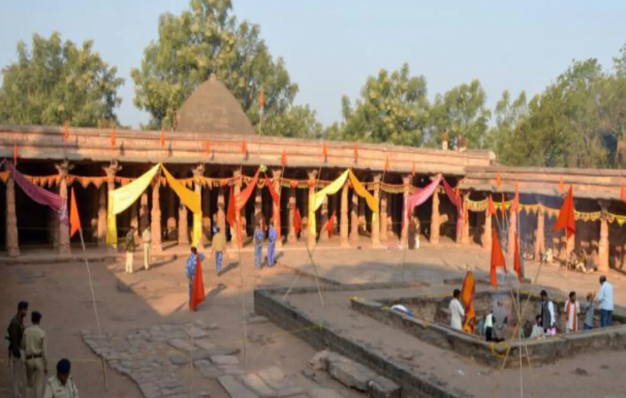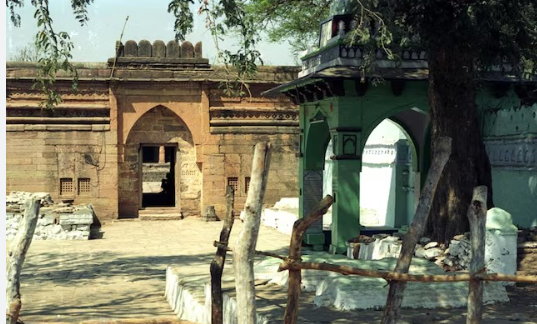the Bhojshala case until it receives further directions:-
In a significant development, the Madhya Pradesh High Court has adjourned the hearing of the Bhojshala case until it receives further directions from the Supreme Court. This decision comes amidst rising tensions and growing anticipation surrounding the long-standing dispute over the Bhojshala monument in Dhar. The adjournment signifies a crucial pause in the judicial proceedings, highlighting the complex interplay of history, religion, and law that defines this case.
The Background of Bhojshala
Historical and Cultural Significance
Bhojshala, an ancient monument located in the town of Dhar in Madhya Pradesh, holds significant historical and cultural importance. It is revered both by Hindus and Muslims. The monument is believed to have been established by the legendary King Bhoj in the 11th century and is associated with the goddess Saraswati. For the Muslim community, it is also known as Kamal Maula’s mosque, named after a revered Sufi saint.  for more information click on this link
for more information click on this link
The Core of the Dispute
TheBhojshala Case dispute centers around the religious practices conducted at the monument. Both Hindu and Muslim communities claim the right to worship at the site. Hindus visit Bhojshala on Tuesdays to offer prayers to Saraswati, while Muslims gather for Namaz every Friday. This shared religious space has been a source of contention, leading to legal battles and frequent tensions between the two communities.
Legal Battle and Recent Developments
Petition in the High Court
The current phase of the legal battle began when a petition was filed in the Madhya Pradesh High Court, seeking exclusive rights for one community to worship at Bhojshala. The petition argued that the concurrent religious practices were not sustainable and led to frequent conflicts. The High Court’s involvement aimed to find a balanced and peaceful solution to this sensitive issue.
Supreme Court’s Intervention
Recognizing the complexity and sensitivity of the dispute, the Madhya Pradesh High Court has decided to await further directions from the Supreme Court. The apex court’s guidance is deemed essential to ensure that any decision made is aligned with national legal standards and sensitivities. The Supreme Court’s involvement is expected to provide a comprehensive framework for resolving the Bhojshala dispute.
Community Reactions
Hindu Community’s Perspective
Members of the Hindu community have expressed mixed reactions to the High Court’s adjournment. Some are hopeful that the Supreme Court will recognize the historical and religious significance of Bhojshala to Hindus and grant them exclusive rights to worship. They argue that King Bhoj’s establishment of the site as a temple is an undeniable historical fact that should be honored.
Muslim Community’s Perspective
The Bhojshala Case Muslim community, on the other hand, views the adjournment with cautious optimism. They hope that the Supreme Court will uphold their right to offer Namaz at the site, which has been practiced for centuries. They emphasize the monument’s dual identity and the need for a solution that respects both religious traditions.
Call for Peaceful Resolution
Leaders from both communities have called for calm and patience, urging their followers to respect the judicial process. There is a shared understanding that a peaceful resolution, guided by the Supreme Court, is essential for maintaining communal harmony in Dhar.
Legal and Social Implications
Impact on Communal Harmony
The Bhojshala case is more than just a legal dispute; it is a reflection of the broader challenge of managing shared religious spaces in a pluralistic society. The case’s outcome will set a precedent for how similar disputes are handled across the country. A balanced and fair resolution has the potential to reinforce communal harmony and trust between different religious communities.
Role of Judiciary
The Bhojshala Case judiciary’s role in such sensitive matters is critical. Courts are tasked with interpreting the law while being mindful of historical contexts and contemporary social dynamics. The decision to adjourn the hearing reflects the High Court’s recognition of the need for a higher judicial perspective to address the complexities involved.
Preservation of Historical Monuments
The Bhojshala Case also brings to light the issue of preserving historical monuments that hold religious significance for multiple communities. Finding a way to honor and protect the cultural heritage of Bhojshala, while respecting the religious sentiments of all stakeholders, is a challenging but necessary endeavor.
The Way Forward
Supreme Court’s Potential Role
As the Supreme Court prepares to issue directions on the Bhojshala case, it faces the task of balancing historical claims, legal principles, and contemporary social realities. The Court’s decision will likely involve detailed hearings, consultations with historians, archaeologists, and representatives from both religious communities.
Possible Outcomes
- Exclusive Rights to One Community: One possible outcome is the granting of exclusive rights to one community, with specific provisions for preserving the monument’s historical significance. This decision could address the grievances of one community but may risk further alienating the other.
 for more information click on this link
for more information click on this link - Shared Access with Specific Guidelines: Another potential resolution is to establish clear guidelines for shared access, with designated times and spaces for each community. This approach would aim to respect the religious practices of both communities while minimizing conflict.
- Government Mediation and Management: The Supreme Court might also direct the government to take a more active role in managing Bhojshala, possibly involving a government-appointed committee to oversee the site’s use and maintenance, ensuring that it remains a symbol of shared heritage.
Community Involvement and Dialogue
Regardless of the legal outcome, fostering ongoing dialogue between the Hindu and Muslim communities in Dhar is crucial. Community leaders, social organizations, and local authorities must work together to promote understanding and cooperation. Efforts to educate the younger generation about the shared history of Bhojshala can also play a vital role in reducing tensions.
Conclusion
The adjournment of the Bhojshala case by the Madhya Pradesh High Court marks a pivotal moment in the ongoing dispute over this historically and culturally significant monument. As the nation awaits further directions from the Supreme Court, the case highlights the intricate balance between law, history, and religion in India.
The Supreme Court’s eventual decision will have far-reaching implications, not only for the communities directly involved but also for the broader framework of managing shared religious spaces across the country. It is a reminder of the judiciary’s critical role in upholding justice and harmony in a diverse and pluralistic society.
As both Hindu and Muslim communities look forward to a resolution, the overarching hope is for a decision that honors the rich heritage of Bhojshala, respects the religious sentiments of all stakeholders, and fosters a spirit of peace and coexistence in Dhar and beyond. ALSO READ:- Mahua, Others Move Supreme Court Against Nameplate Orders by State Governments 2024




